八年级英语上册单词unit2
仁爱英语八年级上册 Unit 2 Topic 2 单词

Unit 2 Topic 2单词1.tired [英][ taɪəd] 疲劳的,累的2.cause [kɔ:z] 促使,引起,使发生n.原因,起因3.litter [英][ lɪtə(r)] 废弃物,垃圾;v.乱丢杂物4.dustbin [ˈdʌstbɪn] 垃圾箱5. fingernail [英][ˈfɪŋgəneɪl] 指甲6.meal [英][mi:l] 一餐(饭)7. without [wɪˈðaʊt] 没有8.article [ ɑ:tɪkl] 文章;东西,物品;9.smoke 吸烟;冒烟10.even [ i:vn] 甚至,连(……都);更11. cancer [ kænsə(r)] 癌12.energy [英][ enədʒɪ] 能量,精力13. necessary [英][ nesəsərɪ] 必需的,必要的14.active [ˈæktɪv] 精力旺盛的;积极的;主动的15.tomato [英][təˈmɑ:təu] 西红柿,番茄16.cabbage [ˈkæbɪdʒ] n.卷心菜,洋白菜17.staple [ˈsteipl] 主食,主打产品18.wheat [ˈwi:t] 小麦19.salt [ˈsɔ:lt] 盐20. sugar [ˈʃugə] 糖21.illness [英][ˈɪlnəs] 疾病22.weak [英][wi:k] 虚弱的,无力的23.cream 奶油24.ice cream [aɪs kri:m] 冰淇淋25. force [fɔ:s] 强迫,迫使26. childhood [tʃaildhud] 童年27.plate [英][pleɪt] 盘子;板;片;牌;盆子28.mad [英][maid] 疯的29.taste [英][teist] 品尝,品味30.surprised [英][səpraizd] 惊讶的,吃惊的31.watermelon [英][ˈwɔ:təmelən] 西瓜32. potato [英][pəˈteɪtəʊ] 土豆,马铃薯potatochips 薯条33.sandwich [ sænwɪdʒ] 三明治(夹心面包片)34.strawberry [ strɔ:bərɪ] 草莓35.beef [英][bi:f] 牛肉36.biscuit [英][biskit] 饼干37.etc [英][etsetərə] 等等38.shower [英][ ʃaʊə(r)] 淋浴;阵雨39.fact [英][fækt]事实,现实40.infact 事实上;实际上41.unhealthy [ʌn helθɪ] 不健康的;会致病的42.chemical [kemikl] 化学品43.cigarette [sigəret] 香烟44.body [英][ bɒdɪ] 身体45.disease [英][dɪˈzi:z] 病,疾病46. harm [英][ha:m] 危害,伤害47.smoker [英][sməʊkə] 吸烟的人48.second-hand 二手的49.risk [英][risk] 危险,风险50.possible [英][pɔsəbl] 可能的51.as…as possible 尽量…地。
八年级上册英语单词表:Unit2
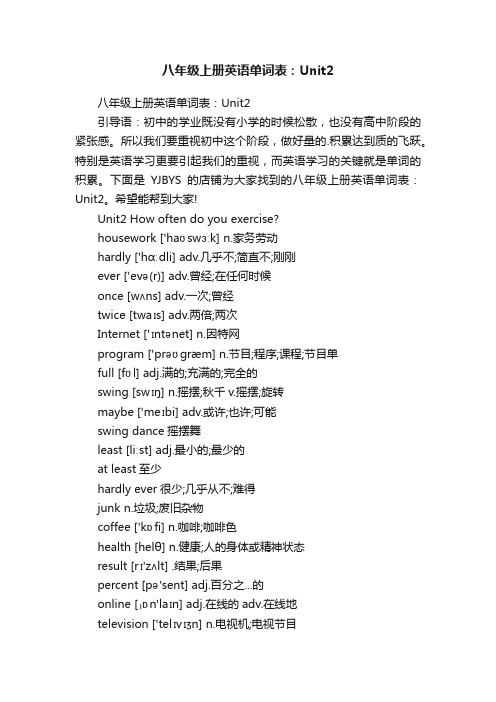
八年级上册英语单词表:Unit2八年级上册英语单词表:Unit2引导语:初中的学业既没有小学的时候松散,也没有高中阶段的紧张感。
所以我们要重视初中这个阶段,做好量的.积累达到质的飞跃。
特别是英语学习更要引起我们的重视,而英语学习的关键就是单词的积累。
下面是YJBYS的店铺为大家找到的八年级上册英语单词表:Unit2。
希望能帮到大家!Unit2 How often do you exercise?housework ['haʊswɜːk] n.家务劳动hardly ['hɑːdli] adv.几乎不;简直不;刚刚ever ['evə(r)] adv.曾经;在任何时候once [wʌns] adv.一次;曾经twice [twaɪs] adv.两倍;两次Internet ['ɪntənet] n.因特网program ['prəʊɡræm] n.节目;程序;课程;节目单full [fʊl] adj.满的;充满的;完全的swing [swɪŋ] n.摇摆;秋千v.摇摆;旋转maybe ['meɪbi] adv.或许;也许;可能swing dance摇摆舞least [liːst] adj.最小的;最少的at least至少hardly ever很少;几乎从不;难得junk n.垃圾;废旧杂物coffee ['kɒfi] n.咖啡;咖啡色health [helθ] n.健康;人的身体或精神状态result [rɪ'zʌlt] .结果;后果percent [pə'sent] adj.百分之...的online [ˌɒn'laɪn] adj.在线的adv.在线地television ['telɪvɪʒn] n.电视机;电视节目although [ɔːl'ðəʊ] conj.虽然;尽管;然而;可是through [θruː] prep.穿过;凭借;一直到body ['bɒdi] n.身体mind [maɪnd] .头脑;想法;意见;心思such [sʌtʃ] adj.这样的;如此的together [tə'ɡeðə(r)] adv.共同;一起die [daɪ] v.死;枯竭;消失writer ['raɪtə(r)] n.作者;作家dentist ['dentɪst] n.牙科医生magazine ['mæɡəziːn] n.杂志however [haʊ'evə(r)] adv.然而;无论如何;不管多么than [ðən] conj.比almost ['ɔːlməʊst] adv.几乎;差不多none [nʌn] pron.没有人;没有任何东西,毫无less [les] adj.更少的;较少的point [pɔɪnt] n.看法;要点;重点;小数点;目标;分数such as例如;诸如junk food n.垃圾食品;无营养食品more than超过;多于;不仅仅;非常less than不到;少于【八年级上册英语单词表:Unit2】。
八年级上册英语unit2单词

八年级上册英语Unit 2 单词一、单词表1.housework /ˈhaʊswɜːk/ 家务劳动;家务事-解析:house(房子)+ work(工作),指在家里做的工作。
-例句:I often help my mother with housework.(我经常帮妈妈做家务。
)2.hardly /ˈhɑːdli/ 几乎不;几乎没有-解析:表示程度很低。
-例句:I hardly ever watch TV on weekdays.(我工作日几乎不看电视。
)3.ever /ˈevə(r)/ 在任何时候;从来;曾经-解析:用于疑问句、否定句和条件句中。
-例句:Have you ever been to Beijing?(你曾经去过北京吗?)4.once /wʌns/ 一次;曾经-解析:表示频率。
-例句:I go to the movies once a month.(我一个月去看一次电影。
)5.twice /twaɪs/ 两次;两倍-解析:表示频率。
-例句:I exercise twice a week.(我一周锻炼两次。
)6.Internet /ˈɪntənet/ (国际)互联网;因特网-解析:全球范围内的计算机网络。
-例句:I use the Internet to do research.(我用互联网做研究。
)7.program /ˈprəʊɡræm/ (=programme) 节目;程序;课程-解析:可以指电视节目、计算机程序或学校的课程。
-例句:What's your favorite TV program?(你最喜欢的电视节目是什么?)8.full /fʊl/ 忙的;满的;充满的-解析:形容事物的状态。
-例句:My schedule is full this week.(我这周的日程很满。
)9.swing /swɪŋ/ 摆动;秋千;(使)摆动;摇摆-解析:既可以作名词表示秋千,也可以作动词表示摆动。
人教版英语八年级上册单词-unit2词汇讲解

Unit 2 How often do you exercise?1. housework[u] 家务= chore [n] do housework = do choreshomework 作业schoolwork 学业2. hardlyhard adv. 努力地、猛烈地(程度副词); adj. 硬的、难的hard-working 努力的work hard 努力工作(work表示动词,hard表示副词)hard work努力工作(work表示名词,hard表示形容词词)hardly adv. 几乎不= seldom = hardly ever 辨析词:nearly 几乎、差不多3. everadv. 曾经; 现在完成时标志词adv. 在任何时候for ever = foreverever since 自那时起辨析词:even 甚至、更加4. once, twice adv. 一次;两次three… times 三次及以上(time表示“时间”,不可数;表示“次数”,可数名词)once 一次,一倍,曾经,一旦(主将从现)once upon a time 从前at once 立刻、马上5. Internet n. 互联网上网surf the Internet = go online在网上on the Internetnet 网network 网络inter-前缀,表示“互相、在……之间” international 国际的6. program n. 节目、程序、项目TV program 电视节目= TV showprogrammer 程序员exchange program 交换项目7. fulladj. 满的、饱的、忙的充满be full of= be filled with充分利用make full use of取得满分get full marksfully adv. 充分地、完全地ful-后缀,表示“充满……的” meaningful 有意义的colorful 多彩的less-后缀,表示“不、无” hopeless 没有希望的homeless 无家可归的8. swingn. 摆动、秋千v. 摇摆swing-swung-swungswing dance 摇摆舞9. maybe adv. 可能= perhaps任务型阅读的推测题中,回答要加maybe表示推断。
人教版八年级英语上册unit2单词
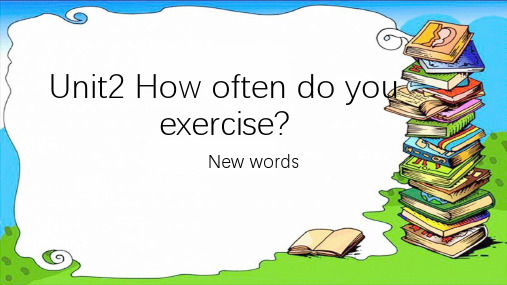
however /haʊˈevə(r)/ adv. 无论如何;不管怎样 than /ðən/conj. 比 more than超过,多于 almost /ˈɔːlməʊst/ adv. 差不多,几乎 none /nʌn/pron. 没有人 less /les/ adj.更少的;较少的 less than不到,少于 point/ pɔɪnt / n.看法;要点
mind/maɪnd/ n.头脑,想法 body/ˈbɒdi/ n.身体 such /sʌtʃ/ adj.这样的,如此的 Such as像......这样 together/təˈɡeðə(r)/ adv. 一起;同 die /daɪ/ v.死,枯竭 writer/ˈraɪtə(r)/ n. 作家;作者 dentist /ˈdentɪst/ n. 牙科医生 magazine /ˌmæ ɡəˈziːn/n. 杂志
Unit2 How often do you exercise?
New words
housework /ˈhaʊswɜːk/ n.家务劳动 hardly/ˈhɑːdli/ adv.几乎不 ever/ˈevə(r)/ adv.曾经 hardly ever很少,几乎从不 once /wʌns/ adv.一次,曾经 twice /twaɪs/ adv.两倍,两次 Internet /ˈɪntənet/ n.因特网 program/ˈprəʊɡræ m/ n.节目,程序
full /fʊl/ adj.满的;充满的 swing/swɪŋ/ n.摇摆 swing dance摇摆舞 maybe/ˈmeɪbi/ adv.或t至少 junk /dʒʌŋk/ n.垃圾,废旧杂物 junk food垃圾食品
American Teenager /ˈtiːneɪdʒə(r)/
人教版英语八年级上册Unit2单词

人教版英语八年级上册Unit2单词序号 英文 中文序号 英文中文1housework/ˈhaʊswɜːk/n.家务劳动;家务事25although/ɔːlˈðəʊ/conj.虽然;尽管;即使2hardly/ˈhɑːdli/adv.几乎不;几乎没有26through /θruː/prep.以;凭借;穿过3ever/ˈevə(r)/adv.在任何时候;从来;曾经27mind /maɪnd/n.头脑;心智4hardly ever 几乎从不28body/ˈbɒdi/n.身体5once/wʌns/adv.一次;曾经29such/sʌtʃ/adj.&pron.这样的;那样的;类似的6twice/twaɪs/adv.两次;两倍30such as 例如;像……这样7Internet/ˈɪntənet/n.(国际)互联网;因特网31together /təˈɡeðə(r)/adv.在一起;共同8program(=programme)/'prəʊgræm/n.节目32die/daɪ/v.消失;灭亡;死亡9full/fʊl/adj.忙的;满的;充满的33writer/ˈraɪtə(r)/n.作者;作家10swing/swɪŋ/n.摆动;秋千34dentist/ˈdentɪst/n.牙科医生11swing/swɪŋ/v.(使)摆动;摇摆35magazine/ˌmæɡəˈziːn/n.杂志;期刊12swing dance摇摆舞36however/haʊˈevə(r)/adv.然而;不过13maybe/ˈmeɪbi/adv.大概;或许;可能37than/ðən/prep.&conj(用以引出比较的第二部分)比14least/liːst/adv.最小的;最少的38more than 多于15least/liːst/adj.&pron.最小的;最少的39almost /ˈɔːlməʊst/adv.几乎;差不多16at least至少;不少于;起码40none/nʌn/pron.没有一个;毫无17junk/dʒʌŋk/n.无用的东西;无价值的东西41less/les/adv.较少;较小18junk food 垃圾食品42less/les/adj.&pron.较少的;更少的19coffee/ˈkɒfi/n.咖啡43less than少于20health /helθ/n.健康;人的身体(或精神)状态44point/pɔɪnt/n.得分;点21result/rɪˈzʌlt/n.结果;后果45point /pɔɪnt/v.指;指向22percent/pəˈsent/n.百分之……46Claire /ˌkleə ˈreɪnə(r)/克莱尔(女名)23online/ˌɒnˈlaɪn/adj.&adv.在线(的);联网(的)47Sue/suː/休(女名)24television/ˈtelɪvɪʒn/n.电视节目;电视机48American Teenager《美国青少年》(文中为虚构的杂志名称)共1页,第1页。
八年级英语上册单词表2
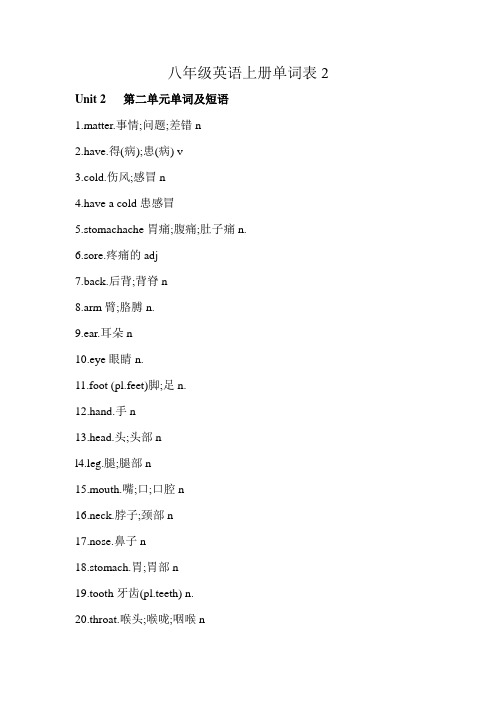
八年级英语上册单词表2 Unit 2 第二单元单词及短语1.matter.事情;问题;差错n2.have.得(病);患(病) v3.cold.伤风;感冒n4.have a cold患感冒5.stomachache胃痛;腹痛;肚子痛n.6.sore.疼痛的adj7.back.后背;背脊n8.arm臂;胳膊n.9.ear.耳朵n10.eye眼睛n.11.foot (pl.feet)脚;足n.12.hand.手n13.head.头;头部nl4.leg.腿;腿部n15.mouth.嘴;口;口腔n16.neck.脖子;颈部n17.nose.鼻子n18.stomach.胃;胃部n19.tooth牙齿(pl.teeth) n.20.throat.喉头;喉咙;咽喉n21.toothache牙痛n.22.fever.发烧;发热n23.rest.休息v24.honey蜂蜜n.25.dentist.牙医n26.should.应该v27.headache头痛n.28.shouldn't=should not29.ago.(距……)以前adv30.so如此;这样pron.31.illness疾病;生病n.32.advice劝告;忠告;建议n.33.thirsty渴的;口渴的adj.34.stress加压力于;使紧张v..压力;紧张n35.be stressed out紧张的;有压力的36.crispy脆的;易碎的;(某些蔬菜和水果)新鲜而脆生的adj.37.cereal.谷类植物;加工而成的,谷类食物(一般指燕麦片、玉米片等早餐食品) n38.cookie.(美)甜饼干;曲奇饼n39.early.早;提早adv40.problem.问题;令人困惑的事物;难以处理的事情n41.way方法;手段;方式;样式n.42.traditional传统的;惯例的adj.43.believe.相信;认为v44.balance.平衡;平衡状态;协调n45.yin(汉)(中国古代哲学认为存在于宇宙万物间的两大对立面之一,跟“阳”相对)阴46.yang(汉)(中国古代哲学认为存在于宇宙万物间的两大对立面之一,跟“阴”相对)阳47.weak/adj.(身体)虚弱的;无力的48.Dangshen(中草药)党参49.Huangqi (中草药)黄芪50.herb.草本植物;药草;香草n51.angry愤怒的;生气的adj.52.tofu.豆腐n53.medicine.药;药物;药剂n54.western.西方的;来自西方的adj55.everybody.每人;人人;各人pron56.get变得v.57.few.(表示否定)很少的;几乎没有的adj58.a few(表示肯定)有些;几个59.stay.继续是;保持v60.important重要的;重大的adj.61.balanced.平衡的;协调的adj62.diet.饮食;节食n63.moment.瞬间;片刻n64.at the moment此时;现在te.晚66.until (=till)直到……之时;在……之前conj.67.dear (表示惊奇、苦恼、懊悔等)呵;哎呀int.68.host family寄宿家庭69.yesterday昨天;昨日n.70.hear.听见;听说v。
八年级上册英语unit2单词知识点
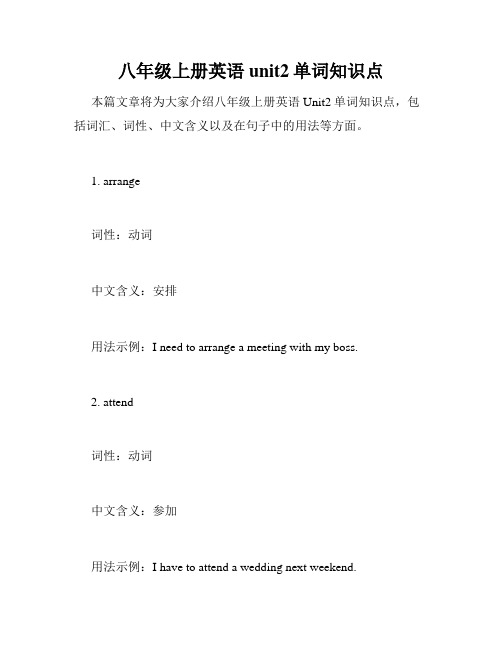
八年级上册英语unit2单词知识点本篇文章将为大家介绍八年级上册英语Unit2单词知识点,包括词汇、词性、中文含义以及在句子中的用法等方面。
1. arrange词性:动词中文含义:安排用法示例:I need to arrange a meeting with my boss.2. attend词性:动词中文含义:参加用法示例:I have to attend a wedding next weekend.3. ceremony词性:名词中文含义:典礼用法示例:The opening ceremony of the Olympic Games was held in Beijing in 2008.4. challenge词性:名词/动词中文含义:挑战用法示例:He accepted the challenge and climbed the highest mountain in the world.5. compete词性:动词中文含义:比赛用法示例:Australian athletes will compete in the Tokyo Olympics.6. congratulate词性:动词中文含义:祝贺用法示例:I want to congratulate you on your success in the exam.7. cooperate词性:动词中文含义:合作用法示例:We need to cooperate to finish the project on time.8. courage词性:名词中文含义:勇气用法示例:It takes courage to speak in front of a large audience.9. defeat词性:名词/动词中文含义:失败用法示例:I don't want to be defeated by difficulties.10. determination词性:名词中文含义:决心用法示例:Determination is the key to success.11. discipline词性:名词中文含义:纪律用法示例:You need to have a good sense of discipline to maintain good habits.12. encouragement词性:名词中文含义:鼓励用法示例:His words of encouragement gave me the motivation to keep going.13. exercise词性:名词/动词中文含义:锻炼用法示例:I always do some exercises to keep myself fit.14. participant词性:名词中文含义:参加者用法示例:All participants need to sign up before the event.15. physical词性:形容词中文含义:身体的用法示例:Physical exercise is good for your health.以上就是八年级上册英语Unit2单词知识点的介绍。
人教版八年级英语上册Unit2单词及短语(附例句)
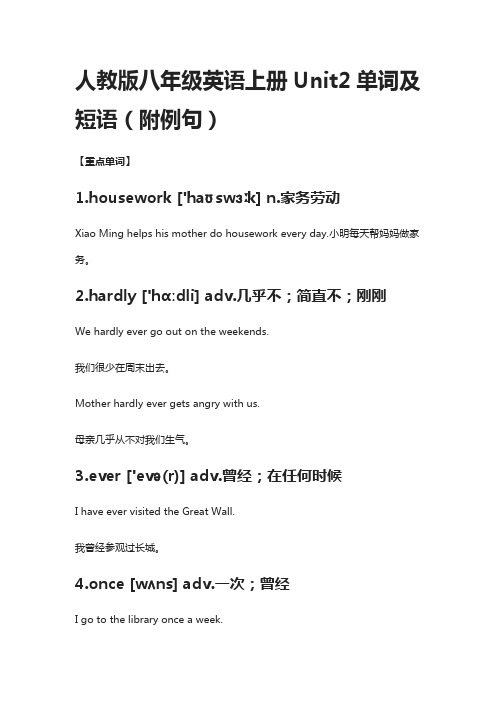
人教版八年级英语上册Unit2单词及短语(附例句)【重点单词】1.housework ['haʊswɜːk] n.家务劳动Xiao Ming helps his mother do housework every day.小明每天帮妈妈做家务。
2.hardly ['hɑːdli] adv.几乎不;简直不;刚刚We hardly ever go out on the weekends.我们很少在周末出去。
Mother hardly ever gets angry with us.母亲几乎从不对我们生气。
3.ever ['evə(r)] adv.曾经;在任何时候I have ever visited the Great Wall.我曾经参观过长城。
4.once [wʌns] adv.一次;曾经I go to the library once a week.我每周去一次图书馆。
5.twice [twaɪs] adv.两倍;两次You can't go to the same place twice.你不可能两次去同一个地方。
6.Internet ['ɪntənet] n.因特网We can get a lot of information from the Internet.我们可以从互联网上得到很多信息。
7.program ['prəʊɡræm] n.节目;程序;课程;节目单This TV program is the best of all.这个电视节目是所有节目中最好的。
This TV program is much better than that one这个电视节目比那个好得多8.full [fʊl] adj.满的;充满的;完全的The bottle is full of milk.瓶子里装满了牛奶。
9.swing [swɪŋ] n.摇摆;秋千v.摇摆;旋转The little sister is swing with her friends.小妹妹正在和她的朋友们荡秋千。
八年级上册英语unit2重点单词
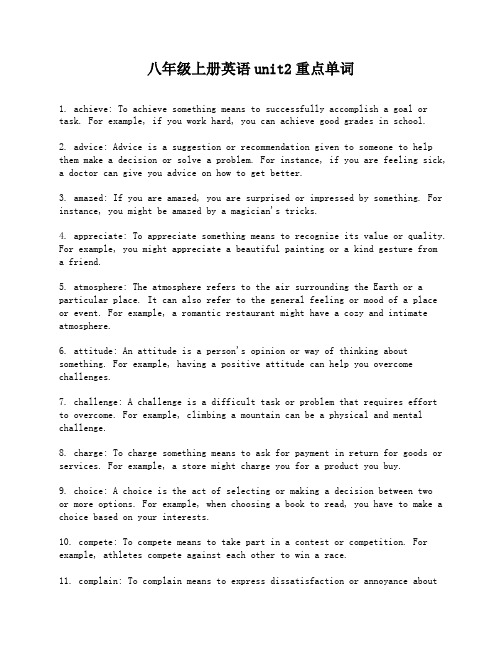
八年级上册英语unit2重点单词1. achieve: To achieve something means to successfully accomplish a goal or task. For example, if you work hard, you can achieve good grades in school.2. advice: Advice is a suggestion or recommendation given to someone to help them make a decision or solve a problem. For instance, if you are feeling sick, a doctor can give you advice on how to get better.3. amazed: If you are amazed, you are surprised or impressed by something. For instance, you might be amazed by a magician's tricks.4. appreciate: To appreciate something means to recognize its value or quality. For example, you might appreciate a beautiful painting or a kind gesture from a friend.5. atmosphere: The atmosphere refers to the air surrounding the Earth or a particular place. It can also refer to the general feeling or mood of a place or event. For example, a romantic restaurant might have a cozy and intimate atmosphere.6. attitude: An attitude is a person's opinion or way of thinking about something. For example, having a positive attitude can help you overcome challenges.7. challenge: A challenge is a difficult task or problem that requires effort to overcome. For example, climbing a mountain can be a physical and mental challenge.8. charge: To charge something means to ask for payment in return for goods or services. For example, a store might charge you for a product you buy.9. choice: A choice is the act of selecting or making a decision between twoor more options. For example, when choosing a book to read, you have to make a choice based on your interests.10. compete: To compete means to take part in a contest or competition. For example, athletes compete against each other to win a race.11. complain: To complain means to express dissatisfaction or annoyance aboutsomething. For example, if you receive a faulty product, you might complain to the store manager.12. concentrate: To concentrate means to focus your attention or effort on a specific task or activity. For example, when studying for an exam, it is important to concentrate to retain information.13. confident: If someone is confident, they have belief in their ownabilities and skills. For example, a confident speaker will present their ideas clearly and convincingly.14. confuse: To confuse means to make someone uncertain or unable to understand something. For instance, if the directions are unclear, it can easily confuse someone trying to find a location.15. contact: To contact someone means to communicate with them, usually by calling or sending a message. For example, you can contact a friend by texting or calling them.16. continuously: Continuously means without interruption or stopping. For example, a marathon runner performs a continuous physical activity.17. convince: To convince someone means to persuade or make them believe something. For instance, a lawyer tries to convince the jury of their client's innocence.18. customer: A customer is a person who buys goods or services from a business. For example, when you go to a restaurant, you are a customer.19. disappoint: To disappoint someone means to fail to meet their expectations or hopes. For example, if you make a promise and break it, you will disappoint the person you made the promise to.20. embarrassed: If someone is embarrassed, they feel self-conscious, awkward, or ashamed. For example, you might feel embarrassed if you trip and fall in front of a group of people.21. encourage: To encourage means to give support, confidence, or hope to someone. For instance, a parent might encourage their child to pursue their dreams.22. environment: The environment refers to the surroundings or conditions in which a person, animal, or plant lives or operates. For example, we should protect the environment by reducing pollution.23. equipment: Equipment refers to the necessary tools, machinery, or other items needed for a particular activity or purpose. For example, a carpenter needs various equipment, such as hammers and saws, to build furniture.24. exercise: Exercise refers to physical activity that is done to improve or maintain physical fitness and health. For example, jogging and cycling are common forms of exercise.25. experience: Experience can refer to either knowledge or skill gained through direct participation in events or activities. For example, having experience as a lifeguard can make someone more confident in saving lives.26. explore: To explore means to travel or investigate a place or idea in order to discover new information. For example, explorers like Christopher Columbus explored new lands to find new trade routes.27. expression: An expression is the process of making known one's thoughts or feelings through words, actions, or facial movements. For example, a smile is an expression of happiness.28. fail: To fail means to be unsuccessful in achieving a goal or completing a task. For example, if you do not study for a test, you might fail it.29. fear: Fear is an unpleasant emotion caused by the belief that someone or something is dangerous, likely to cause pain, or a threat. For instance, some people have a fear of heights.30. focus: To focus means to pay attention and concentrate on a particular thing. For example, if you want to perform well in a competition, you need to focus on your training.31. frustrated: If someone is frustrated, they feel annoyed or upset because they are unable to achieve their goals or desires. For example, you might feel frustrated when you cannot solve a difficult math problem.32. habit: A habit is a regular tendency or practice that is hard to give up. For example, brushing your teeth twice a day is a good oral hygiene habit.33. horrible: Horrible means extremely unpleasant or disagreeable. For instance, if you have a terrible stomachache, you might describe it as a horrible pain.34. independent: Independent means being able to do things for oneself without relying on others. For example, when teenagers become adults, they strive tobe independent.35. introduce: To introduce means to present someone to another person by name or with a formal greeting. For example, in a business meeting, you might introduce yourself to new colleagues.36. knowledge: Knowledge refers to understanding or information gained through learning, experience, or study. For example, students gain knowledge by attending classes and studying textbooks.37. locate: To locate means to find the position or place of something or someone. For example, using a map can help you locate a specific address.38. luxury: A luxury is something expensive or difficult to obtain that provides great comfort or pleasure. For example, staying at a five-star hotel is considered a luxury.39. manage: To manage means to be in control of or responsible for thedirection and guidance of something or someone. For instance, a manager is responsible for managing employees and tasks.40. material: Material refers to the matter from which a thing is or can be made. For example, wood and metal are materials used for building furniture.41. memory: Memory refers to the faculty by which the mind stores and remembers information or experiences. For example, you might have a good memory for faces but not names.42. miserable: Miserable means very unhappy or uncomfortable. For instance, if you get caught in the rain without an umbrella, you will feel miserable.43. misunderstand: To misunderstand means to fail to interpret someone's words, actions, or intentions correctly. For example, if you mishear a friend's name, you might misunderstand what they said.44. mood: Mood refers to a temporary state of mind or feeling. For instance,if you are in a good mood, you are cheerful and happy.45. nervous: If someone is nervous, they feel anxious or worried about something. For example, you might feel nervous before giving a speech.46. notice: To notice means to become aware of or pay attention to somethingor someone. For example, if a friend changes their hairstyle, you might notice it.47. occasion: An occasion is a particular time or instance of an event. For example, a wedding is a joyous occasion.48. offer: To offer means to present or propose something for acceptance or rejection by someone else. For example, a store might offer a discount on a product.49. opportunity: An opportunity is a favorable or suitable time or chance todo something. For example, getting a job promotion can be seen as an opportunity for career advancement.50. organize: To organize means to arrange or set up a system or structure for something. For example, when moving houses, you need to organize your belongings to ensure a smooth transition.51. patient: Patient can refer to two different meanings. It can mean theability to accept or tolerate delays, problems, or suffering without becoming annoyed or anxious. Alternatively, it can refer to a person receiving medical treatment from a doctor. For example, if you wait calmly for your turn at the doctor's office, you are being patient.52. perform: To perform means to carry out or fulfill a task, action, or function. For instance, musicians perform concerts for their fans.53. pleasant: Pleasant means giving a sense of happy satisfaction or enjoyment. For example, a pleasant fragrance can make your living room smell nice.54. prefer: To prefer means to like or want one thing more than another. For example, some people prefer tea over coffee.55. prepare: To prepare means to make ready or put together for a particular purpose or activity. For instance, students prepare for exams by studying and reviewing.56. promise: A promise is a declaration or assurance that one will do a specified thing or that a particular outcome will occur. For example, if you promise to meet a friend at a specific time, it means you commit to being there.57. protect: To protect means to keep someone or something safe from harm, injury, or danger. For example, parents protect their children from potential dangers.58. provide: To provide means to give or supply something needed or desired by someone. For instance, a teacher provides students with information and knowledge.59. public: Public refers to things that are done, seen, or used by everyone rather than kept private or restricted to a particular group. For example, a public park is open to everyone.60. react: To react means to respond to something in a particular way. For instance, if someone scares you, your natural reaction might be to scream.61. reason: A reason is a cause, explanation, or justification for an action or event. For example, if you cannot attend a party, you may have a valid reason, such as a family function.62. recognize: To recognize means to identify someone or something by remembering or noting its similarities to previous encounters or experiences. For example, you might recognize a familiar face in a crowd.63. recommend: To recommend means to suggest or endorse something as being good or suitable for a particular purpose. For instance, a friend might recommend a book they enjoyed reading.64. reduce: To reduce means to make smaller or less in size, amount, importance, or degree. For example, recycling can help reduce waste andprotect the environment.65. relaxed: If someone is relaxed, they are free from tension or anxiety. Forexample, lying on a beach during vacation can help you feel relaxed.66. rely: To rely means to depend on or trust in someone or something. For instance, you rely on your alarm clock to wake you up in the morning.67. remind: To remind means to cause someone to remember something. For example, sending a calendar reminder can help remind you of an appointment.68. respect: Respect refers to a feeling of deep admiration for someone or something elicited by their abilities, qualities, or achievements. For instance, you should respect your elders.69. revise: To revise means to review or make changes or corrections to something previously written or spoken. For example, before submitting an essay, it is important to revise and edit it.70. reward: A reward is something given in recognition of one's services, efforts, or achievements. For instance, receiving a trophy is a reward for winning a competition.71. risk: A risk is a situation involving exposure to danger or harm. For example, skydiving involves taking on some level of risk.72. rude: If someone is rude, they are impolite or ill-mannered. For example, talking loudly on a phone inside a library is considered rude.73. search: To search means to try to find something by looking for it carefully. For example, if you lose your keys, you will need to search for them.74. serve: To serve means to perform duties or provide services for someone. For instance, waiters and waitresses serve customers in a restaurant.75. skill: A skill is the ability to do something well, typically gained through training or experience. For example, cooking is a skill that can be developed over time.76. social: Social refers to relating to or involving activities done with others. For instance, attending parties and gatherings is a social activity.77. solution: A solution is the means of solving a problem or dealing with adifficult situation. For example, if you are lost, asking for directions can provide a solution.78. spare: Spare can refer to two different meanings. It can mean additional to what is required for ordinary use, or it can mean to refrain from harming or destroying someone or something unnecessarily. For example, buying spare batteries ensures you have backups when needed.79. speech: A speech is a formal talk given to an audience. For instance, politicians often give speeches to explain their policies and ideas.80. stranger: A stranger is a person whom one does not know or who is not familiar. For example, you should be cautious when talking to strangers.81. tense: Tense can refer to two different meanings. It can mean a verb form that expresses an action or state in progress or at a particular time (e.g., past tense). Alternatively, it can mean feeling, showing, or causing fear and anxiety. For example, waiting for exam results can make students feel tense.82. terrible: Terrible means very bad or unpleasant. For instance, having a terrible headache can make it hard to concentrate.83. translate: To translate means to convert words or text into another language. For example, a translator can translate a document from English to Spanish.。
八年级上册英语unit2 单词用法分类归纳
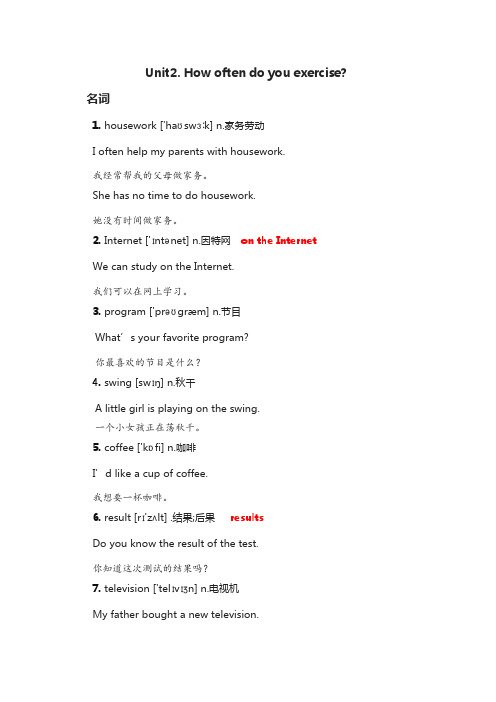
Unit2. How often do you exercise? 名词1.housework ['haʊswɜːk] n.家务劳动I often help my parents with housework.我经常帮我的父母做家务。
She has no time to do housework.她没有时间做家务。
2.Internet ['ɪntənet] n.因特网on the InternetWe can study on the Internet.我们可以在网上学习。
3.program ['prəʊɡræm] n.节目What’s your favorite program?你最喜欢的节目是什么?4.swing [swɪŋ] n.秋千A little girl is playing on the swing.一个小女孩正在荡秋千。
5.coffee ['kɒfi] n.咖啡I’d like a cup of coffee.我想要一杯咖啡。
6.result [rɪ'zʌlt] .结果;后果resultsDo you know the result of the test.你知道这次测试的结果吗?7.television ['telɪvɪʒn] n.电视机My father bought a new television.我爸爸买了一台新电视机。
8.body ['bɒdi] n.身体Playing sports is good for your body.做运动对你的身体有好处。
9.mind [maɪnd] n.头脑I think it’s good for my mind.我认为它对我的头脑有好处。
10.health [helθ] n.健康health-healthyI think junk food is bad for your health.我认为垃圾食品对你的健康有害。
八年级上册英语第二单元单词
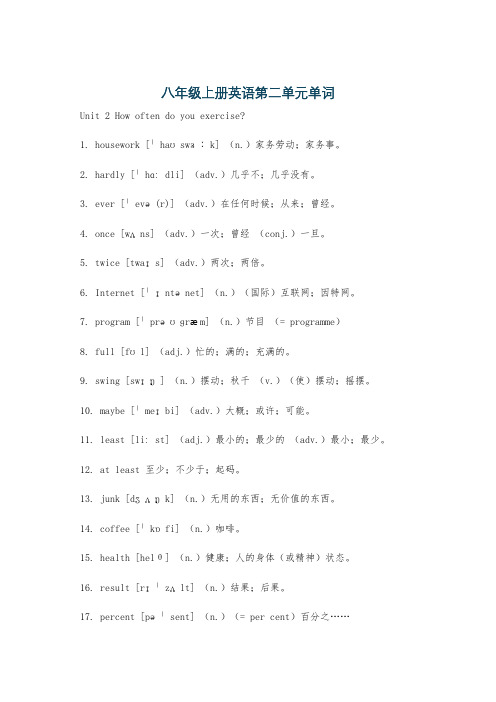
八年级上册英语第二单元单词Unit 2 How often do you exercise?1. housework [ˈhaʊswɜːk] (n.)家务劳动;家务事。
2. hardly [ˈhɑːdli] (adv.)几乎不;几乎没有。
3. ever [ˈevə(r)] (adv.)在任何时候;从来;曾经。
4. once [wʌns] (adv.)一次;曾经(conj.)一旦。
5. twice [twaɪs] (adv.)两次;两倍。
6. Internet [ˈɪntənet] (n.)(国际)互联网;因特网。
7. program [ˈprəʊɡræm] (n.)节目(= programme)8. full [fʊl] (adj.)忙的;满的;充满的。
9. swing [swɪŋ] (n.)摆动;秋千(v.)(使)摆动;摇摆。
10. maybe [ˈmeɪbi] (adv.)大概;或许;可能。
11. least [liːst] (adj.)最小的;最少的(adv.)最小;最少。
12. at least 至少;不少于;起码。
13. junk [dʒʌŋk] (n.)无用的东西;无价值的东西。
14. coffee [ˈkɒfi] (n.)咖啡。
15. health [helθ] (n.)健康;人的身体(或精神)状态。
16. result [rɪˈzʌlt] (n.)结果;后果。
17. percent [pəˈsent] (n.)(= per cent)百分之……18. online [ˌɒnˈlaɪn] (adj. & adv.)在线(的);联网(的)19. television [ˈtelɪvɪʒn] (n.)电视节目;电视机。
20. although [ɔːlˈðəʊ] (conj.)虽然;尽管;即使。
21. through [θruː] (prep.)以;凭借;穿过。
英语八年级上册第2单元单词课文与语法
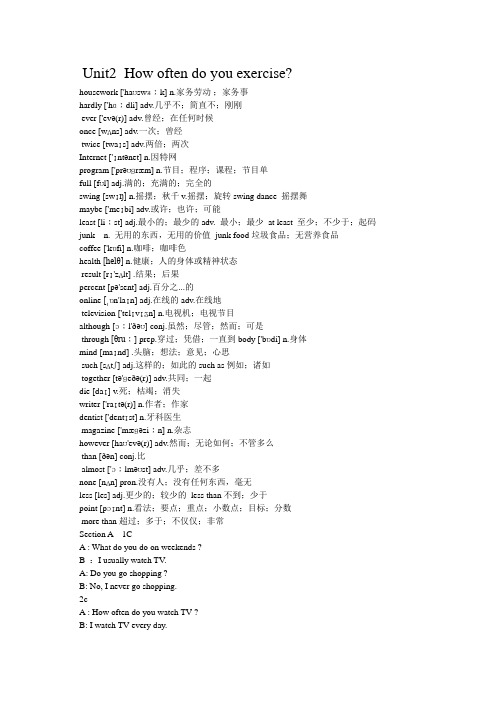
Unit2 How often do you exercise?housework ['haʊswɜːk] n.家务劳动;家务事hardly ['hɑːdli] adv.几乎不;简直不;刚刚ever ['evə(r)] adv.曾经;在任何时候once [wʌns] adv.一次;曾经twice [twaɪs] adv.两倍;两次Internet ['ɪntənet] n.因特网program ['prəʊɡræm] n.节目;程序;课程;节目单full [fʊl] adj.满的;充满的;完全的swing [swɪŋ] n.摇摆;秋千v.摇摆;旋转 swing dance 摇摆舞maybe ['meɪbi] adv.或许;也许;可能least [liːst] adj.最小的;最少的adv. 最小;最少at least 至少;不少于;起码junk n. 无用的东西,无用的价值junk food垃圾食品;无营养食品coffee ['kɒfi] n.咖啡;咖啡色health [helθ] n.健康;人的身体或精神状态result [rɪ'zʌlt] .结果;后果percent [pə'sent] adj.百分之...的online [ˌɒn'laɪn] adj.在线的adv.在线地television ['telɪvɪʒn] n.电视机;电视节目although [ɔːl'ðəʊ] conj.虽然;尽管;然而;可是through [θruː] prep.穿过;凭借;一直到 body ['bɒdi] n.身体mind [maɪnd] .头脑;想法;意见;心思such [sʌtʃ] adj.这样的;如此的such as例如;诸如together [tə'ɡeðə(r)] adv.共同;一起die [daɪ] v.死;枯竭;消失writer ['raɪtə(r)] n.作者;作家dentist ['dentɪst] n.牙科医生magazine ['mæɡəziːn] n.杂志however [haʊ'evə(r)] adv.然而;无论如何;不管多么than [ðən] conj.比almost ['ɔːlməʊst] adv.几乎;差不多none [nʌn] pron.没有人;没有任何东西,毫无less [les] adj.更少的;较少的 less than不到;少于point [pɔɪnt] n.看法;要点;重点;小数点;目标;分数more than超过;多于;不仅仅;非常Section A 1CA : What do you do on weekends ?B :I usually watch TV.A: Do you go shopping ?B: No, I never go shopping.2cA : How often do you watch TV ?B: I watch TV every day.A: What’s your favourite program ?B: Animal World.A:How often do you watch it ?B: Twice a week.2dJack : Hi, Claire, are you free next week ?Claire: Hmm … next week is quite full for me, Jack.Jack : Really ? How come ?Claire: I have dance and piano lessons.Jack: W hat kind of dance are you learning ?Claire: Oh, swing dance. It’s fun ! I have class once a week, every Monday.Jack : How often do you have piano lessons ?Claire: Twice a week, on Wednesday and Friday.Jack : Well, how about Tuesday ?Claire: Oh, I have to play tennis with my friends. But do you want to come ?Jack : Sure !Grammar Focus1.How often ______ he play soccer ? a. Yes. She usually does.2. _____ you drink milk ? b. Hardly ever. I don’t like them.3. How often _________ they stay up late ? c. He palys at least twice a week.4. ____ Sue eat a healthy breakfast ? d. No, they don’t . They’re too busy.5. How often _____ you eat apples ? e. Never. They always go to bed early.6. _____ your parents play sports ? f. Yes, I do. Every day.Section B1bA : How often do you drink milk , Liu Fang ?B : I drink milk every day.A : Do you like it ?B : No. But my mother wants me to drink it . She says it’s good for my health.2bWhat Do No.5 High School Students Do in Their Free Time ?Last month we asked our students about their free time activities. Our questions were about exercise, use of the Internet and watching TV. Here are the results.We found that only fifteen percent of our students exercise every day. Forty-five percent exercise four to six times a week. Twenty percent exercise ony one to three times a week. And twentypercent do not exercise at all !We all know that many students often go online, but we were surprised that ninety percent of them use Inernet every day. The other ten percent use it at least three or four times a week. Most students use it for fun and not for homework.The answers to our questions about watching television were also interesting. Only two percent of the students watch TV one to three times a week. Thirteen percent watch TV four to six times a week. And eight-five percent watch TV every day! Although many students like to watch sports, game shows are the most popular.It is good to relax by using the Internet or watching game shows, but we think the best way to relax is through exercise. It is healthy for the mind and the body. Exercise such as playing sports is fun, and you can spend time with your friends and family as you play together. And remember, “old habits die hard.” So start exercising before it’s too late !语法频度副词频度副词表示行为动作的频率,例如,always 总是,usually 通常,often 经常,sometimes 有时,hardly ever 几乎不,never 从不。
Unit2单词讲解人教版八年级英语上册
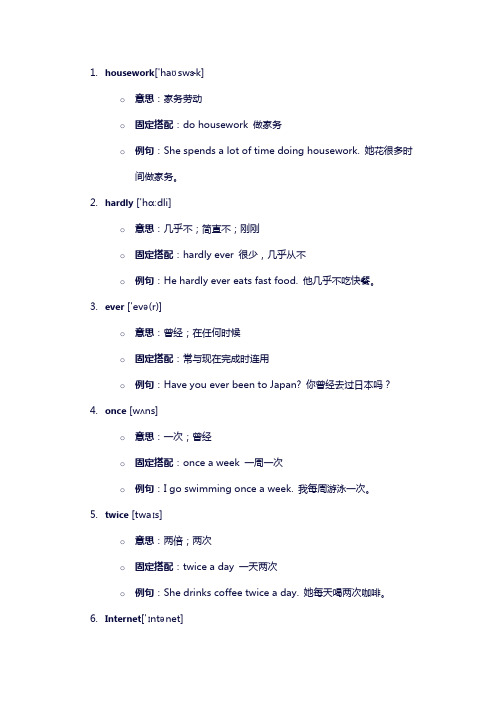
1.housework['haʊswɝk]o意思:家务劳动o固定搭配:do housework 做家务o例句:She spends a lot of time doing housework. 她花很多时间做家务。
2.hardly ['hɑːdli]o意思:几乎不;简直不;刚刚o固定搭配:hardly ever 很少,几乎从不o例句:He hardly ever eats fast food. 他几乎不吃快餐。
3.ever ['evə(r)]o意思:曾经;在任何时候o固定搭配:常与现在完成时连用o例句:Have you ever been to Japan? 你曾经去过日本吗?4.once [wʌns]o意思:一次;曾经o固定搭配:once a week 一周一次o例句:I go swimming once a week. 我每周游泳一次。
5.twice [twaɪs]o意思:两倍;两次o固定搭配:twice a day 一天两次o例句:She drinks coffee twice a day. 她每天喝两次咖啡。
6.Internet['ɪntənet]o意思:因特网o固定搭配:surf the Internet 上网o例句:I often surf the Internet after dinner. 我晚饭后经常上网。
7.program['prəʊɡræm]o意思:节目;程序;课程;节目单o固定搭配:puter program 计算机程序o例句:She watches her favorite program every night. 她每晚都看她最喜欢的节目。
8.full [fʊl]o意思:满的;充满的;完全的o固定搭配:be full of 充满...o例句:The room is full of books. 房间里堆满了书。
9.swing [swɪŋ]o意思:摇摆;秋千v.摇摆;旋转o固定搭配:swing dance 摇摆舞o例句:She enjoys dancing the swing dance. 她喜欢跳摇摆舞。
八年级英语上册unit 2 重点单词、短语、句子
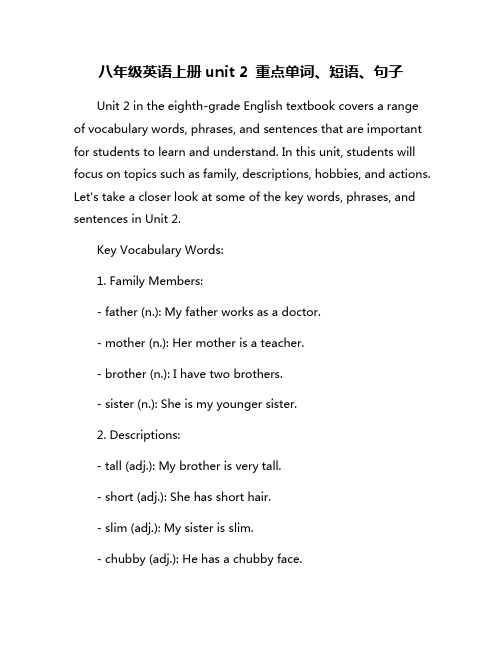
八年级英语上册unit 2 重点单词、短语、句子Unit 2 in the eighth-grade English textbook covers a range of vocabulary words, phrases, and sentences that are important for students to learn and understand. In this unit, students will focus on topics such as family, descriptions, hobbies, and actions. Let's take a closer look at some of the key words, phrases, and sentences in Unit 2.Key Vocabulary Words:1. Family Members:- father (n.): My father works as a doctor.- mother (n.): Her mother is a teacher.- brother (n.): I have two brothers.- sister (n.): She is my younger sister.2. Descriptions:- tall (adj.): My brother is very tall.- short (adj.): She has short hair.- slim (adj.): My sister is slim.- chubby (adj.): He has a chubby face.3. Hobbies:- play (v.): I like to play basketball.- read (v.): She enjoys reading books.- swim (v.): We often swim in the summer.- dance (v.): He loves to dance.Key Phrases:1. Talking about Family:- How many brothers do you have?- What does your mother do?- Is your father tall or short?2. Describing People:- She has long hair and blue eyes.- He is wearing a red shirt and jeans.- My sister is very friendly and outgoing.3. Hobbies and Activities:- I enjoy playing the piano in my free time.- They like to swim at the beach on weekends.- What do you do for fun?Key Sentences:1. My father is a lawyer and my mother is a chef.2. I have two sisters and one brother.3. She has curly hair and brown eyes.4. We often go hiking in the mountains on weekends.5. Do you like to dance or sing?Overall, the vocabulary words, phrases, and sentences in Unit 2 are essential for students to grasp in order to communicate effectively in English. By practicing these words and phrases, students will be able to describe their family members, talk about their hobbies, and engage in conversations about various topics. Keep practicing and reviewing these key elements to improve your English skills!。
八年级上册英语单词上海u2
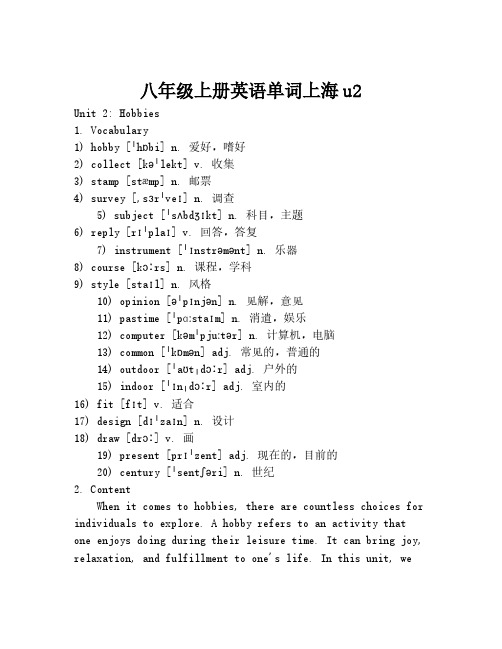
八年级上册英语单词上海u2Unit 2: Hobbies1. Vocabulary1) hobby [ˈhɒbi] n. 爱好,嗜好2) collect [kəˈlekt] v. 收集3) stamp [stæmp] n. 邮票4) survey [,sɜrˈveɪ] n. 调查5) subject [ˈsʌbdʒɪkt] n. 科目,主题6) reply [rɪˈplaɪ] v. 回答,答复7) instrument [ˈɪnstrəmənt] n. 乐器8) course [kɔːrs] n. 课程,学科9) style [staɪl] n. 风格10) opinion [əˈpɪnjən] n. 见解,意见11) pastime [ˈpɑːstaɪm] n. 消遣,娱乐12) computer [kəmˈpjuːtər] n. 计算机,电脑13) common [ˈkɒmən] adj. 常见的,普通的14) outdoor [ˈaʊtˌdɔːr] adj. 户外的15) indoor [ˈɪnˌdɔːr] adj. 室内的16) fit [fɪt] v. 适合17) design [dɪˈzaɪn] n. 设计18) draw [drɔː] v. 画19) present [prɪˈzent] adj. 现在的,目前的20) century [ˈsentʃəri] n. 世纪2. ContentWhen it comes to hobbies, there are countless choices for individuals to explore. A hobby refers to an activity that one enjoys doing during their leisure time. It can bring joy, relaxation, and fulfillment to one's life. In this unit, wewill dive into the fascinating world of hobbies and discover the various interests that people pursue.Collecting is a popular hobby among people of different ages. Some individuals collect stamps, while others gather coins or even rare antiques. Collecting allows us toappreciate and preserve valuable items from the past. It also serves as a fascinating way to learn about history, cultures, and different countries.In order to better understand hobbies in our school, we conducted a survey among our classmates. The results showed a wide range of interests. Many students enjoy playing musical instruments such as the guitar, piano, or drums. Others havea passion for sports and participate in activities like basketball, swimming, or volleyball. In addition, a number of students expressed their love for painting, drawing, andother artistic endeavors.Opinions on hobbies can vary greatly. Some individuals believe that hobbies should be related to one's future career, while others see them as a way to relax and unwind. It is important to respect everyone's choices and understand that hobbies are personal preferences.Hobbies can be divided into two categories: indoor and outdoor. Indoor hobbies are activities that can be done inside, such as reading, playing video games, or solving puzzles. On the other hand, outdoor hobbies involveactivities like gardening, hiking, or cycling. Both types of hobbies offer unique experiences and benefits.One of the most common hobbies in today's digital age is using computers. Whether it is browsing the internet, coding, or playing online games, computers have become an integralpart of our daily lives. They provide entertainment,facilitate communication, and offer a platform for creativity.When pursuing a hobby, it is important to find a balance between enjoyment and productivity. Some hobbies, likewriting or photography, can lead to a potential career path. Others, such as cooking or knitting, provide relaxation and a sense of accomplishment. The key is to choose a hobby thatfits one's interests and schedule.In conclusion, hobbies play a significant role in our lives. They bring joy, foster personal growth, and allow usto explore our passions. Whether it is collecting stamps, playing a musical instrument, or engaging in outdooractivities, hobbies enhance our well-being and enrich our everyday experiences. So, let's embrace our hobbies and make the most of them!3. Extended Thoughts and ReflectionsAs we continue to explore hobbies, it is crucial toreflect on the benefits they bring beyond personal satisfaction. Hobbies not only help us develop new skills and passions but also contribute to our overall well-being. Engaging in hobbies has been proven to reduce stress, improve mental health, and enhance cognitive abilities.Furthermore, hobbies can also serve as a bridge between individuals, fostering social connections and creating opportunities for collaboration. Participating in group activities related to our hobbies allows us to meet like-minded individuals who share our interests and values. This can lead to valuable friendships, networking opportunities, and even potential business partnerships.In today's fast-paced world, where work demands and daily responsibilities can sometimes be overwhelming, hobbiesprovide us with a much-needed escape. They offer a form of self-expression, allowing us to relax, recharge, and tap into our creative side. By dedicating time to hobbies, we also learn to prioritize our well-being and find a balance between our personal and professional lives.Moreover, hobbies have the power to unlock undiscovered talents and passions within us. They challenge us to step out of our comfort zones, try new things, and explore uncharted territories. Through this process, we discover hidden strengths, increase our self-confidence, and unleash our full potential.In conclusion, hobbies should not be dismissed as mere pastimes or distractions. They have the potential to shape our lives, nurture our personal growth, and contribute to our overall happiness and fulfillment. So, let's continue to pursue our passions, embrace new hobbies, and seize every opportunity for self-discovery and self-improvement.。
- 1、下载文档前请自行甄别文档内容的完整性,平台不提供额外的编辑、内容补充、找答案等附加服务。
- 2、"仅部分预览"的文档,不可在线预览部分如存在完整性等问题,可反馈申请退款(可完整预览的文档不适用该条件!)。
- 3、如文档侵犯您的权益,请联系客服反馈,我们会尽快为您处理(人工客服工作时间:9:00-18:30)。
一.用所给词的适当形式填空.
1.Don’t get_________(stress) out. You should listen to music.
2.Chongqing is in the __________(west) part of China.
3.It’s important to est a ____________(balance) diet.
4.You look tired.Why not ________(have) a rest.
5.The boy always eats_________eggs and ________ meat.(too many)
6.The boy eats too much, he has a _________(stomach).
7.It’s easy _______(write) an e-mail.
8.He wasn’t here because.of the _________(ill).
9.I like eating__________(tradition) food.
10.I’m sorry _________(hear) tha t he is ill.
11.He doesn’t feel ________(good) today.
12..He shouldn’t_______(eat) anything for twenty-four hours.
13..Traditional Chinese doctors believe we should eat a __________(balance) diet.
14. “What’s the matter with her?” “She_________(have ) a headache.”
15.It________(start) an hour ago.
16.It’s easy _____(stay) healthy.
17.When you __________(be) tired, you should go to bed early.
18.She enjoys___________(listen) to music very much.
19.The teacher___________(talk) to his father at the moment.
20.I study very hard but my English___________(not improve).
21.It’s important for us___________(speak) English every day.
22.Everyone_______(get) angry or happy sometimes.
23.I_________( not feel ) well at the moment.
二.句型转换
1.You should eat something ,too.(否定句)
2.He has a fever.(提问)
3.You should lie down and rest.(改祈使句)
4.Li Ping didn’t come to school today because he is ill.(提问)
5.You should see a dentist.(提问)
6.What’s wrong with Tom?(同义句)
7.He can’t hear anything.(同义句)
8.There is much water in the bottle.(提问)
9.There are two pictures on the wall.(用tomorrow和yesterday改写)
10.It often takes me two hours to finish my homework..(提问)
1 2 3
三.改错。
每题有一处错,找出并改正在题后横线上
1.I hear you had the headache yesterday.
2.She should eats more vegetables.
3.I’m very hungry. I want to drink some water.
e your head and you’ll get a idea.
5.I bought a house in a large garden.
6.You are too stressed out. You must listen to music. _________
7.Amy shoulds practice the guitar. She can’t play well. ________
8.Your English book may under the bed in their room. ________
四.单项选择
( )1.This maths problem is so difficult that only____students can work it out.
A.a few
B.few
C.a little
D.little
( )2.I’m not feeling very_____at the moment. A.good B.well C.better D.best
( )3.Eating a _____diet to stay healthy. A.balance B.balancing C.balanced
( )4.Let’s go to the teacher for____.
A.a advice
B.an advice
C.some advice
D.some advices
( )5.You look ill. Why_____to see the teacher?
A.not go
B.don’t go
C.not going
D.not to go
( )6.Li Ping___a bad cold. Call the doctor, please. A.have B.has C.is D.does
( )7.You shouldn’t drink ______water before sleep.
A.too much
B.too many
C.much too
D.many too
( )8. “Is he all right?” “No,I ______.”
A.think so
B.don’t think so
C.think
D.don’t think
( )9._____vegetables _______good for you.
A.Eat, are
B.Eating, are
C.Eating, is
D.Eat, is
( )10.“What’s the matter___Jim?”“He has a fever.”
A.at
B.for
C.with
D.about
( )11.-Can you sing the song in English? -No, I________.
A.may not
B.mustn’t
C.can’t
D.don’t
( )12.Must I finish my homework in class? No, you_______.
A.can’t
B.mustn’t
C.needn’t
D.may not
( )13.John __come to see us tonight, but he isn’t sure yet. A.may B.can C.must
( )14.The traffic(交通)____stop when the lights are red.
A.must
B.mustn’t
C.may
D.can
( )15.We____sleep too late to be healthy.
A.can’t
B.don’t have to
C.shouldn’t
D.should
( )16.-My mother is ill in hospital. -_______________.
A.What’s the matter?
B.I’m sorry to hear that.
C.I’m not feeling well.
D.She’ll be all right soon.。
